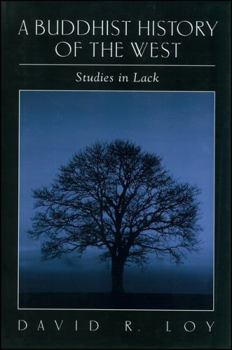A Buddhist History of the West: Studies in Lack
Select Format
Select Condition 
Book Overview
Buddhism teaches that to become happy, greed, ill-will, and delusion must be transformed into their positive counterparts: generosity, compassion, and wisdom. The history of the West, like all histories, has been plagued by the consequences of greed, ill-will, and delusion. A Buddhist History of the West investigates how individuals have tried to ground themselves to make themselves feel more real. To be self-conscious is to experience ungroundedness...
Format:Hardcover
Language:English
ISBN:079145259X
ISBN13:9780791452592
Release Date:January 2002
Publisher:State University of New York Press
Length:256 Pages
Weight:1.00 lbs.
Dimensions:1.1" x 6.3" x 9.1"
Customer Reviews
3 ratings
Studies in Lack
Published by Thriftbooks.com User , 15 years ago
Freedom, progress, fame, money, the nation-state, corporate capitalism, mechanistic science, civil society, consumerism; hardly new themes, but this inquiry into the origins of our preoccupation with them casts them in a different light. Loy's lack approach has not attempted a "balanced" evaluation that weighs the positive against the negative consequences for our historical development - whatever that might mean. Instead, the argument has been that each is problematical in a way that has been little noticed, if at all. If the argument is valid, what does it mean for us today? Our ever-growing technological powers imply that it is increasingly dangerous for us to be motivated by an unconscious drive for "being", for a grounding that can never be attained in the way we seek it. From a traditional religious perspective, the most important characteristic of the modern world is its secularity, more precisely our understanding of ourselves as motivated by solely this-worldly possibilities. After lack itself, therefore, the most important thread that winds its way through all the chapters is the notion that a lack of perspective vitiates our usual distinction between sacred and secular. If the problem provided by our sense of lack cannot be avoided, the difference between sacred and secular is reduced to where we think our lack can be resolved. This leaves us, finally, with an urgent question: What does this critique mean for those of us now reluctant to believe in mythological notions of transcendence? If our "secular" responses are not working to assuage our lack, as Loy has argued, then what solutions are possible for those agnostic of other "higher" worlds? The author concludes his study with some reflections on this, which amplify some hints scattered here and there in the chapters.
Highly Recommended
Published by Thriftbooks.com User , 21 years ago
This is an incredibly insightful contribution to our understanding of why Western institutions have become so destuctive of the world around us while generally failing to provide people with a sense of meaning, direction, or pleasure in life. As Loy so clearly articulates, Buddhism offers a perspective that can transform our lives and, perhaps, our self-destructive culture.
Bringing Buddhism Back Home
Published by Thriftbooks.com User , 22 years ago
For Westerners who've had a taste of Buddhist practice or insights, there comes a moment when we must look back on our own cultural heritage and wonder, "What the hell happened?" Why this long 2,500 year detour into dominating nature and building social empires? Why this absorbtion into disconnected individualism? Loy's book is exciting trailblazing into the emerging field of putting Buddhist concepts to work to decode history. Highly recommended. Gassho.






